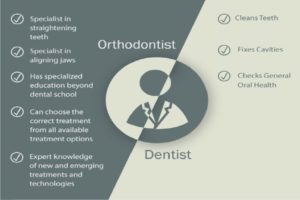Table of Contents

When you have the right support and training, as a general dentist or a dental specialist you can provide your patients with good orthodontic care. So one may ask what the difference is and which one is a better option? Either one can be rewarding or have different benefits. As you read this guide, it will help you to determine whether orthodontic continuing education for general dentists is a suitable choice for you or not. This relies on some common considerations.
Orthodontic Residency vs. Orthodontic Continuing Education
As a dentist in the USA, if you decide to dedicate yourself to orthodontics, you will first have to apply to one of the accredited orthodontic residency programs (one of 67 programs). After 2 or 3 years of full-time training, you can specialize in orthodontics and treat patients only within this realm of care. This could be a great option if you know you are passionate about orthodontics and only want to treat patients with orthodontic care or needs. As a dentist, you must be able and willing to dedicate about 2 to 3 years to get specialized training, as well as beat, abut other applicants.
If you want to help patients with braces but do not want to limit your services, you should know there are several platforms such as Gerety Orthodontic Seminars that provide continuing education programs to help you. As you attend one of these courses or programs, you could continue to provide general dentistry work, but also expand your services to include orthodontic care.
Although there are many continuing CE courses available today, this blog will help you to focus on comprehensive orthodontics that lasts to about 18 to 24 months in their duration since it is more comparable to orthodontic residencies.
Note that getting reputable GP training in orthodontics can prove to be the best option, especially if you want to provide your patients with the best care in a variety of areas and need to start making money soon.
Time Investment
When it comes to the time each one takes, orthodontic residencies tend to have a commitment that is more extensive with residents dedicating about 2 to 3 years or full-time for schooling. Within this time, residents focus on their training in their class and apply their knowledge during the patient rotations at hospitals or universities.
On the other hand, comprehensive orthodontic continuing education programs are typically 18 to 24 months part-time commitments. Usually, there are also extensive multi-level programs that help to add to additional or advanced master’s curriculum for about 3 to 4 years part-time study. In orthodontic continuing education, classes usually run for a few days or each month. Since they are part-time, you could continue to work and apply for training on your patient between sessions.
Knowledge in Orthodontics
Orthodontists receive special training to understand as well as treat all types of orthodontic cases. During residency, you get the chance to try different products, appliances, systems and listen to guest speakers that universities access. You can try several appliances, learn about different systems and read the literature to get a good understanding of the historical discussions and figures that happen in orthodontics.
When it comes to taking CE programs, dentists typically do not have the finances and time to learn everything about each system like a full orthodontic reside. Usually, the dentists will learn about one or two systems that work for them. Most orthodontic courses focus on the practical aspect of providing a high level of orthodontic care. Since there is less time, students may not be able to get as much background with orthodontic history, literature review and various systems. Although there is some loss in this academic knowledge, dentists who choose this option tend to like how they can focus their efforts efficiently on getting a high level of diagnostic understanding and knowledge in treatment.
Clinical Ability and Practicality
Orthodontics is a very intellectual specialty and the clinical ability is something correlated with the experience of diagnosis. Hence, the best work in orthodontics often comes from specialists and dentists that see and treat more patients.
Since the best accredited orthodontic residency programs have guidelines and more hours of training, there is much more control over the ability of graduates to expect what they should have. In residency, dentists or residents in the hospital and clinics rotate to get their surgical and clinical experience.
However, graduates of comprehensive orthodontic programs also have a high level of clinical skill, but this varies in terms of the program and individual. Similar to residents, seeing and diagnosing cases is invaluable to gain clinical orthodontic skills, but typically, general dentists have the advantage of a greater breadth of experience in dentistry, which helps to improve their retention and diagnosis ability.
The rewards of orthodontic continuing education can be highly satisfactory and turn out to be a great addition to your practice. You should know there are several ways you could accomplish your goal, which can be both enriching and lucrative. Explore your options and consider enrolling in CE today.


